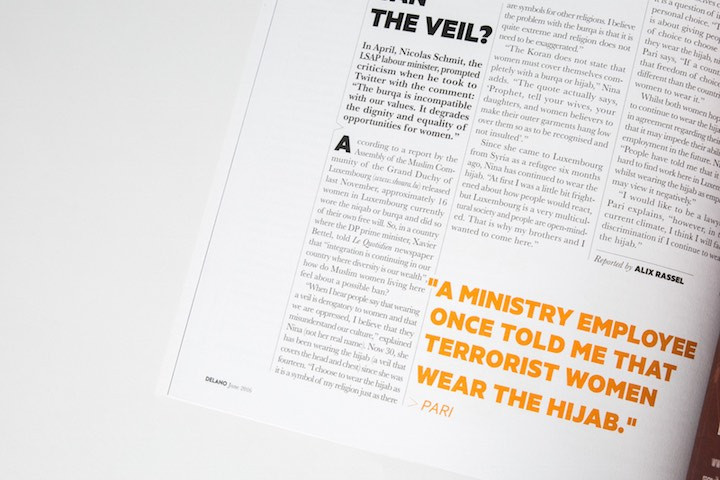According to a report by the Assembly of the Muslim Community of the Grand Duchy of Luxembourg released last November, approximately 16 women in Luxembourg currently wore the niqab or burqa and did so of their own free will. So--in a country where the DP prime minister, Xavier Bettel, told Le Quotidien newspaper (in French) a short time later that “integration is continuing in our country where diversity is our wealth”--how do Muslim women living here feel about a possible ban?
“When I hear people say that wearing a veil is derogatory to women and that we are oppressed, I believe that they misunderstand our culture,” explained Nina (not her real name). She is a 30 year old Muslim woman who has been wearing the hijab (a veil that covers the head and chest) since she was fourteen. “I choose to wear the hijab as it is a symbol of my religion just as there are symbols for other religions. I believe the problem with the burqa is that it is quite extreme and religion does not need to be exaggerated.”
Indeed, in the majority of Muslim countries (except Saudi Arabia and parts of Afghanistan and Iran), it is not mandatory to wear the burqa, niqab or hijab. “The Koran does not state that women must cover themselves completely with a burqa or hijab,” Nina adds. “The quote actually says, ‘Prophet, tell your wives, your daughters, and women believers to make their outer garments hang low over them so as to be recognised and not insulted’.”
When she was in Syria, she viewed the hijab as protection. “Unless it was a male member of your family, no man would approach, touch or talk to you in the street when you were wearing the hijab, it would be extremely disrespectful.”
Since she came to Luxembourg as a refugee six months ago, Nina has continued to wear the hijab. “At first I was a little bit frightened about how people would react, but Luxembourg is a very multicultural society and people are open-minded. That is why my brothers and I wanted to come here.”
Unfortunately, for Pari, another Muslim woman living in the Grand Duchy (and likewise a pseudonym), her experience has not been as positive. “A ministry employee once told me that terrorist women wear the hijab. I really felt that the employee was trying to provoke me into removing it, so I became more insistent on wearing it. I wear the hijab because of my faith and of my own free will; I’m not doing anything wrong by wearing it.”
Self-imposed ban?
Like Nina, Pari also does not believe that the Koran obliges women to cover themselves completely but that it is a question of interpretation and personal choice. “To me democracy is about giving people the freedom of choice to choose whether or not they wear the hijab, niqab or burqa.” Pari says, “If a country takes away that freedom of choice, they are no different than the countries that oblige women to wear it.”
Whilst both women hope to be able to continue to wear the hijab, they are in agreement regarding their concerns that it may impede their ability to find employment in the future. Nina says: “People have told me that it will be hard to find work here in Luxembourg whilst wearing the hijab as employers may view it negatively.”
“I would like to be a lawyer,” Pari explains, “however, in the current climate, I think I will face discrimination if I continue to wear the hijab.”
